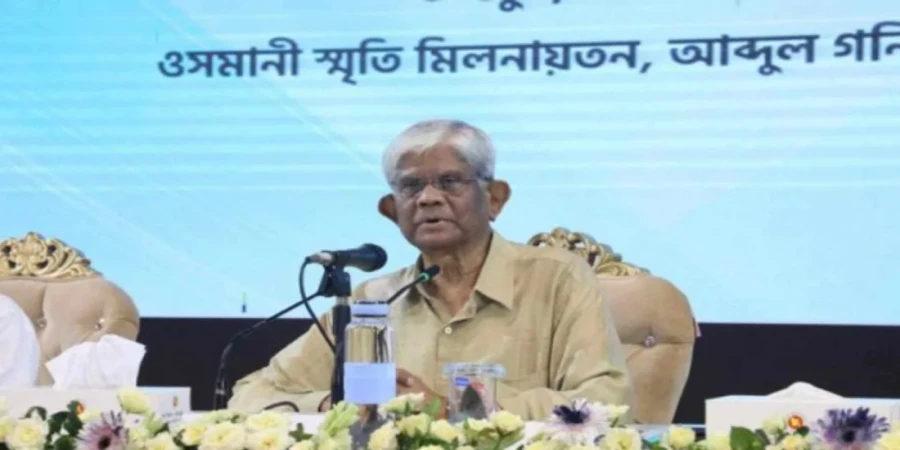
ছবি: Photo: Collected
In the post-budget press conference, Dr. Salehuddin Ahmed emphasizes stability over rhetoric, citing inflation, banking sector weaknesses, and fiscal constraints behind a cautious 2025–26 budget.
Economic Adviser Dr. Salehuddin Ahmed defended the 2025–26 national budget in a post-budget press conference held on Tuesday, June 3, at the Osmani Memorial Auditorium, addressing mounting concerns from the media and public. Reflecting on the dire situation his administration inherited, he remarked, “When the country was in the ICU, teetering on the edge of collapse, we didn’t seize power—we assumed responsibility.”
Dr. Ahmed emphasized that the present administration had taken charge during one of the most economically and institutionally fragile periods in recent history. He noted that had they not intervened when they did, the consequences could have been catastrophic. The adviser highlighted that the responsibility they accepted was particularly focused on restoring order to the financial management system, which had been facing deep instability.
“We have collectively tried to bring the country to a place of stability,” he said. “The reforms we’ve initiated are ongoing. We will do as much as we can, and we hope the path we have paved will be carried forward by those who follow.”
Due to the absence of a functioning parliament, the budget for the fiscal year 2025–26 was presented directly to the nation on Monday, June 2. The associated Finance Bill was signed by the President, allowing the administration to proceed. Addressing this unusual arrangement, Dr. Ahmed acknowledged the limitations but reiterated the necessity of moving forward within the constraints of the current governance framework.
He offered a candid assessment of the context in which the budget was prepared. “We have limited resources, yet the demand is immense,” he explained. “We are operating amidst global challenges, domestic disorder in law and order, the fragile state of the banking sector, and economic pressures resulting from global capitalism.”
Dr. Ahmed was clear in stating that this budget was not an exercise in rhetorical flair. “We didn’t draft this budget with lofty language or idealistic promises. We had to consider pressing challenges like inflation, problems in the banking and energy sectors, and the task of revenue collection,” he said. “Despite all this, we haven’t increased the overall size of the budget.”
This year’s proposed budget, totaling BDT 7.9 trillion (Tk 790,000 crore), was announced through national broadcast. The budget comes at a time when the macroeconomy is under pressure from multiple angles, including high inflation, stringent conditions attached to foreign loans, and a significant shortfall in domestic revenue generation.
Challenging previous narratives that emphasized rapid GDP growth as a sign of national progress, Dr. Ahmed posed a critical question: “Yes, growth was high. But who actually benefited from that growth?” He stressed the need to shift the focus from raw economic indicators to meaningful improvements in people’s quality of life.
“The current budget was designed with ordinary citizens in mind. We considered how to improve standards of living, increase purchasing power, and ensure that trade and business can continue under these strained conditions,” he explained.
The press conference began at 3 PM and saw the presence of several key advisers and government officials. Among them were Commerce Adviser Sheikh Bashiruddin, Home Affairs Adviser Lt. Gen. (Retd.) Jahangir Alam Chowdhury, Planning Adviser Dr. Wahiduddin Mahmud, Power and Energy Adviser Faizul Kabir, Cabinet Secretary Dr. Sheikh Abdur Rashid, Finance Division Secretary Dr. Md. Khairuzzaman Majumder, National Board of Revenue (NBR) Chairman Md. Abdur Rahman Khan, and Bangladesh Bank Governor Ahsan H. Mansur.
Throughout the briefing, Dr. Ahmed and his colleagues responded to questions posed by journalists regarding the new fiscal strategy. The conference took place against a backdrop of public concern over inflation, fiscal discipline, and external debt sustainability.
The government now faces the significant challenge of implementing a budget that must deliver stability without expanding its fiscal footprint, all while navigating an uncertain global economic environment. Dr. Ahmed’s remarks suggest a deliberate pivot toward pragmatic policy-making, focused on systemic reform and long-term resilience rather than short-term popularity.
repoter






